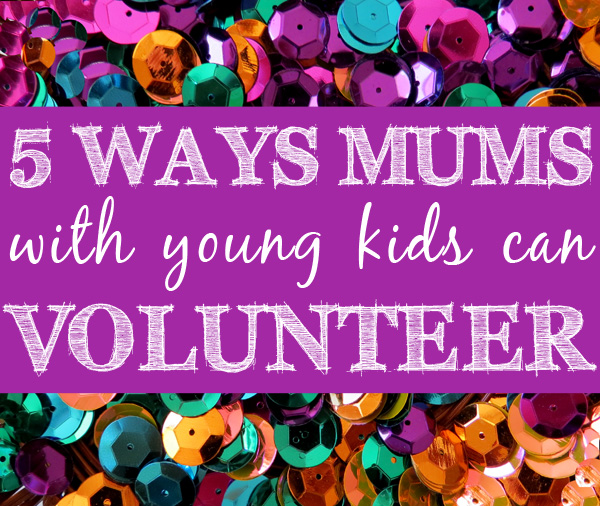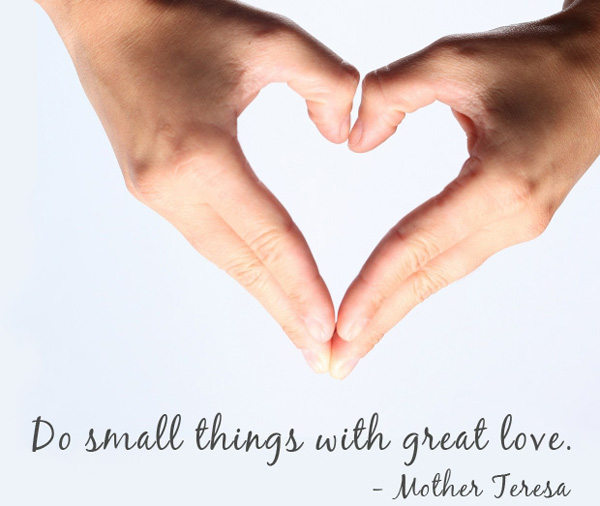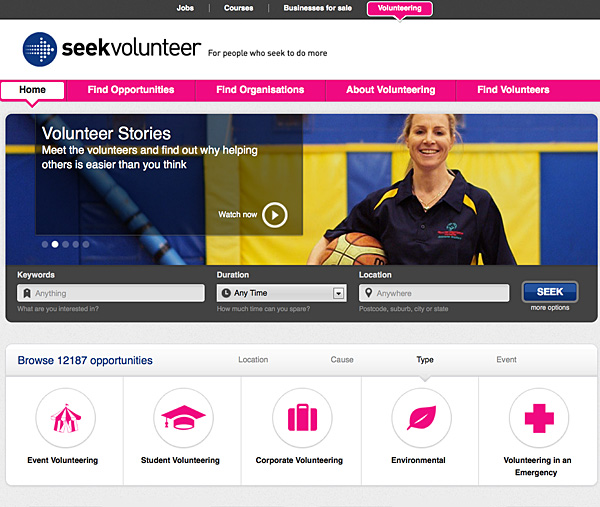5 Ways Mums With Young Kids Can Volunteer
This is a sponsored post.
I was excited to receive a notice home from Immy’s school recently asking for assistance preparing costumes for this year’s performing arts production. As a year one student Immy is too young to be involved with the production but it was nice that the invitation to volunteer time and skills was extended beyond the upper-primary classes producing the musical. Now truth be told, my machine sewing skills could only be described as intermediate at best but I LOVE a good musical and I am more than happy to help with sequinning and embellishments, as well as with any basic sewing required.
More than anything, I find this sort of opportunity to volunteer and help others provides me with a greater sense of community. And as a work-from-home Mum who spends most of her day conversing in one or two word sentences in the company of a just-turned-2 year old this is important to me. Without making purposeful connections with others (and a little adult conversation) it can be easy to feel isolated.
However, as rewarding as I find volunteering, I personally find it difficult to commit to many ongoing volunteering or service options as I juggle family life with two small children and work. Which got me thinking about the fact that volunteering doesn’t always have to be about going to an external agency or undertaking big, ongoing commitments. In fact, when you look around you, there are many simple but meaningful ways to help others within your own, local community.
5 Ways to Volunteer (and Make a Difference) With Kids in Tow
1. Ask about opportunities at your children’s school, kindergarten, preschool or playgroup.
Schools, preschools and playgroups are generally more geared to working with parents with young children in tow. As you read your school’s newsletter or visit your child’s school, look at upcoming projects or events with mindfulness towards how you might be able to help – look for opportunities that are a good fit for your interests and skills, and even if there is not a specific mention of needing assistance, don’t be afraid to ask if they are in need of some extra help.
For those with prior-to-school aged children, ask at playgroup if there is something you can help with – for example, offer to take home the painting aprons for laundering or to stay back to wash a tub of toys once a month.
2. Help another family
Do you know of a family with a new baby, or one struggling with illness, family loss, or just generally having a hard time? If so, consider ways that you might be able to provide support or offer assistance. This could include;
- Making contact: The first step is to simply make contact, and sometimes just taking this step and being a friend with a listening ear is enough.
- Making meals: Even simple functions such as thinking about what to cook and preparing meals can be difficult when you are in the midst of significant stress (or ongoing sleep deprivation!) This post, Bringing Food to Friends in Need, has lots of meal ideas for what to prepare, as well as suggestions for organising a group of friends to help, and even how to prepare food that is easy to transport and to freeze.
- Picking up groceries: Most of us head to the grocery store regularly anyway, so picking up an extra litre of milk, loaf of bread and carton of eggs isn’t too difficult.
- Helping to care for children: Offering to be an extra pair of hands around the house, to watch children while parents rest, or even to babysit while they attend appointments can be a big help.
3. Offer to help a neighbor
Sometimes opportunities to help are literally right outside your front door and don’t need to be difficult. Elderly neighbours, new parents, neighbours planning to travel – all present opportunities to offer assistance.
4. Look for everyday opportunities whilst out and about in your local community
I might not be free to help with a community event on Clean Up Australia Day but I can encourage my children to help me pick up rubbish I see at the local playground or beach. Small actions, like offering to take another person’s trolley back to the trolley bay as you do your own, don’t take a lot of extra effort but can make all the difference to someone else’s day. Holding a door for someone, helping to direct someone who is lost, giving up your seat on crowded public transport, mowing a neighbour’s lawn as you have the mower out to do your own – all are acts of service that create a positive sense of community.
5. Donate pre-loved belongings in good condition
As you sort through your family’s pre-loved clothes, toys and household items consider donating those in good condition to a local shelter, children’s hospital, op shop or other local community organisation. It doesn’t take a lot of extra time to donate and it also helps to reduce landfill.
Did you know this week is National Volunteer Week (May 12-16) in Australia? For those looking for volunteer opportunities outside of their immediate community, the SEEK Volunteer website makes finding volunteer positions related to your talents, passions and existing commitments simple. Opportunities can be searched by location, type of cause, personal interests, personal circumstances (there is a great family friendly search option), length of commitment and your availability.
Whatever form it takes, as you volunteer and reach out to help others you are likely to find that you are the one feeling the biggest sense of reward. At the same time you are acting as a model of kindness, compassion and caring for your own children, whilst also teaching them important practical life skills – and as the future leaders in our society, these are important qualities to nurture. Sounds like a win for everyone to me 🙂
Do you volunteer at your child’s school or within your local community? How do you juggle family and personal commitments with making time available to volunteer?




Great suggestions and links to get involved within the community. Thank you.
Thank you, Louise.
Great starting ideas, Christie. I inherited the volunteering ethos from my parents and grandparents, and am passing it on to my kids. Officially I am a ‘farmer’s wife’, ‘stay at home mum’ and ‘student’ but the volunteering is often done with my kids at my side. As a family we dropped some of the sporting commitments and picked up volunteer commitments instead – so far we have done scouts, cadets, and botanic/environmental group (tree planting, bird watching, rubbish retrieval). My youngest child started kindy, so I finally started my journey as a country ambulance volunteer, a 20 year ambition that I realised I had to make time to do. 3 years later I am pursuing a new career pathway identified by way of this ambulance volunteering. My kids are very very proud, and will be volunteers in the future. I want people to know that you don’t need to head overseas on goodwill missions. Local groups often need someone else to be part of their team. Don’t be afraid to say ‘YES’, its the start of a wonderful journey!
Thank you so much for sharing your experiences, Denise, so great to hear how you and your family have been so active in your community 🙂
SO many great suggestions! I love to volunteer and need to do more. Thanks so much for sharing.
Thanks, Jen.
These are great suggestions. I’ve always wanted to volunteer somewhere, but as you said, with a young family it doesn’t always feel possible. You’ve given me some great starting points, thanks.
So glad you found the suggestions helpful, Ness, good luck with finding something to suit you 🙂
It’s so hard to find the time to volunteer. These are some great suggestions.
It can be hard to find the time, Katrina, I agree. Hope you find something that suits your family circumstances.
Love this post, Christie! I often freak out and think “I should volunteer!” but my next thought is “when?” as I’ve got two pre-school kids, work, dog house, etc to squeeze into the 18 hours I’m awake each day! As you’ve outlined with these ideas, mums do an enormous amount of “volunteering” simply by helping each other out, passing surplus veg over the fence or picking up someone else’s chip packet that didn’t make it to the bin. It’s so true that charity begins at home. Formal volunteering will always be there, and I look forward to making it part of my life once the kids are both at school. Another fabulous resource Australia is ethicaljobs.com.au for those who are looking to contribute more.
I am keen to check out the SEEK Volunteer website, sounds like a handy way to find something that would suit our family. I really enjoy volunteering at my children’s school, it is a wonderful way to meet other parents and get to know your child’s classmates a little better too. There have been a few instances where we have responded to call outs for volunteers and were able to involve our children. It was wonderful for our children to see first hand what a difference they can make through their actions and how giving does bring joy to others.
Awesome post with some great tips. I have recently started helping out in my son’s classroom – simple things like with a messy craft project or helping glue in art work into the kids’ scrapbooks. It doesn’t take much from me – except a bit of time – but I know it makes a difference to the teacher. Thanks for sharing!
Love these ideas… I think it is so important for our kids to see us giving our time and skills as well as just our ‘cash’.
I find it easier to volunteer for ‘one off’ things. I usually can’t commit for an ongoing long term job thanks to kids schedules and shift working husband, but I can commit to turn up for an afternoon working bee, or a day picking up and delivering items.
I’ve been thinking about volunteering for a while, especially since having children, but time is so precious. These ideas are so practical and achievable, thank you.
This is all great info!
I volunteer often with my kids (2, 6 and 8 years old). We use many of the project ideas and conversation starters available at BigHeartedFamilies.org.
Thank you for the link, Sarah 🙂
Great post. I volunteer for the Scouts. Even bigger organisations don’t have to be about a regular time commitment. I’ve got two small children, and my volunteering is about looking after the training of other adult volunteers, so I fit it around what I can manage and around other commitments, when my eldest was tiny, he used to come along to Scouts with me – the teenagers loved it! Seriously though, don’t dismiss bigger or more structured organisations, we’re always looking for somebody to maintain the stores, do admin, write press releases and keep social media up-to-date, as well as the people running the meetings every week.
Great advice, Melanie, thank you 🙂
Wonderful tips to make volunteering and helping people easy Christie!
I work in a place that has some EXCELLENT volunteers and honestly they not only make work easier but they bring their own expertise to the place. They are so important for us and we cherish them. I know when the time is right I’d like to do something similar for another organisation. Our wildlife park couldn’t sustain ourselves without their generosity of time!
Thank you so much, Penny, and thank you for sharing your experience with volunteers 🙂
‘Charity begins at home’…i’d ask all people with small children to be mindful of this saying and to think of the rationale for why you want to volunteer when so much of your time would ordinarily be spent addressing the needs of your small children. Altruism?…or maybe to elicit a form of external recognition (esteem from others) to the potential detriment of your own children. Food for thought.
Great list of tips! I’m on my village Pre-School committee now my daughter is at Pre-School. It’s a great way to use my skills and give back to the community. I wrote this post about 11 ways to meet Mummy friends which mentioned volunteering: http://byelsieb.com/eleven-proven-ways-to-make-mummy-friends/